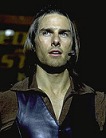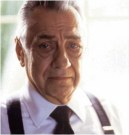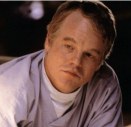| Magnolia |
| |
|
|
USA,
1999. Rated R. 179 minutes.
Cast: Jason Robards,
Julianne Moore, Tom Cruise, Philip Seymour Hoffman, John C. Reilly, Melora
Walters, Jeremy Blackman, Michael Bowen, William H. Macy, Philip Baker
Hall, Melinda Dillon, Emmanuel Johnson, Henry Gibson, Luis Guzman, Felicity
Huffman, Ricky Jay, Alfred Molina
Writer: Paul Thomas Anderson
Music: Jon Brion (score), Aimee Mann (songs)
Cinematographer: Robert Elswit
Producer: Joanne Sellar
Director: Paul Thomas Anderson
LINKS
|
 hough
I'm tempting fate by inviting slings and arrows from what will prove to be an
enormous chorus of doubters, I just have to say it anyway: Magnolia is
a masterpiece. Is it flawless? No. But it's the most audacious, courageous,
and cinematically complex filmmaking of the year... a deeply collaborative tightrope
walk of immense proportions. Paul Thomas Anderson's exquisite tone poem to anguish
and salvation is ridiculously ambitious. Structured more like music than like
narrative film, it unfolds in a series of meticulously structured and rendered
movements, each with a distinct rhythm and tone of its own. The seamless adjustments
made by this amazing ensemble cast and the stellar artists responsible for cinematography,
editing, and music seem nothing short of miraculous. Everyone is on the same
page at every turn, and it's exhilirating to witness that. I suspected that
it might turn out to be a masterpiece when it reduced me to actual weeping.
Not the dignified lone tear sneaking down my cheek sort of weeping. The
quivering jaw with tears streaming uncontrollably sort of weeping. I
realized then that I was weeping as much out of a film-buff's gratitude for
the awesome artistry of the accumulation of sequences that induced those tears
as I was for the sadness up on the screen. And that's where the line is bound
to be drawn around this film. If you're not moved by the how, you probably
won't be inordinately moved by the what.
hough
I'm tempting fate by inviting slings and arrows from what will prove to be an
enormous chorus of doubters, I just have to say it anyway: Magnolia is
a masterpiece. Is it flawless? No. But it's the most audacious, courageous,
and cinematically complex filmmaking of the year... a deeply collaborative tightrope
walk of immense proportions. Paul Thomas Anderson's exquisite tone poem to anguish
and salvation is ridiculously ambitious. Structured more like music than like
narrative film, it unfolds in a series of meticulously structured and rendered
movements, each with a distinct rhythm and tone of its own. The seamless adjustments
made by this amazing ensemble cast and the stellar artists responsible for cinematography,
editing, and music seem nothing short of miraculous. Everyone is on the same
page at every turn, and it's exhilirating to witness that. I suspected that
it might turn out to be a masterpiece when it reduced me to actual weeping.
Not the dignified lone tear sneaking down my cheek sort of weeping. The
quivering jaw with tears streaming uncontrollably sort of weeping. I
realized then that I was weeping as much out of a film-buff's gratitude for
the awesome artistry of the accumulation of sequences that induced those tears
as I was for the sadness up on the screen. And that's where the line is bound
to be drawn around this film. If you're not moved by the how, you probably
won't be inordinately moved by the what.
The most common comparison made in any mention of Magnolia is to Robert
Altman's Short Cuts, a film that is also set in Los Angeles and (like
much of Altman's work) juggles multiple characters and storylines that may or
may not ultimately intersect. While there's no question that Altman is an inspiration
to Anderson's narrative structure in that regard, the relevant similarities
stop there. In filmmaking terms, Magnolia bears a closer resemblance
to Titanic than to Short Cuts. Anderson is employing the medium
with the same level of single-minded deliberation that Cameron brought to his
romantic epic, though the two films couldn't be more different in style or in
the details of the what that they're presenting. This kind of filmmaking
is manipulation of the highest order... entreating you to surrender to a very
specific vision, and (if you're game) rewarding that surrender with the two
best things you can hope to find in a film: the sense that you've somehow been
transported somewhere else, and the unquantifiable pleasure of having
a genuine emotional response. Those who resist–focusing merely on the surface
of story or character development–will almost certainly find it wanting. Those
who let Magnolia take them where it wants to go will later discover that
it returns the favor. This is a movie that follows you home if you show it an
ounce of love.
AboutFilm.Com
The Big Picture
|
| Alison |
B
|
| Carlo |
C+
|
| Dana |
A+
|
| Jeff |
A-
|
| Kris |
D+
|
| ratings explained |
Magnolia has a story, but it's not really about story at all. It's about
intimacy and isolation, forces that collide catastrophically in an alarming
number of ways, but also converge from time to time, bringing a measure of grace
that redeems and repairs us. Anderson's approach to these characters and their
stories is fascinating and incredibly daring. The settings are realistic, but
the overall tone is surreal and often absurd. Onto this foundation he places
the actors, whose impeccable performances ground the film with a profoundly
resonant emotional realism. It shouldn't work, but it does. And the reason it
works is because Anderson's strategy is to meditate on intimacy by employing
intimacy itself. He's less concerned with the particulars of what happens to
these characters than he is with what's happening inside of them. Each individual's
progression is a variation on his primary thematic hook: pain evolving into
dread evolving into panic evolving into anguished surrender. It's up to the
actors to let us inside of this, and Anderson knows exactly when and how to
frame those moments of intimate exchange between character and audience. Blessed
with a cast that truly understands what he's going for, Anderson accomplishes
a genuine rarity: a directorial extravaganza that's equally an actors' showcase.
The storylines and characters revolve around two dying men, Earl Partridge
(Jason Robards) and Jimmy Gator (Philip Baker Hall) who - as it turns out -
are also connected, effectively connecting their separate spheres to one another,
and thus connecting each individual character to the rest. Partridge is a wealthy
man trapped in his luxurious deathbed, tended to by a hospice nurse named Phil
Parma (Philip Seymour Hoffman). His attendant family consists only of fur-clad
trophy wife, Linda (Julianne Moore), but he also has an estranged son named
Frank T.J. Mackey (Tom Cruise), whom he hasn't seen in decades. The other dying
man is still mobile, but no less doomed. Jimmy Gator is the beloved host of
the longest running game show in America, What Do Kids Know? He's got
a loving and loyal long-term wife, Rose (Melinda Dillon), and–like Earl–also
has an estranged child, an adult daughter named Claudia (Melora Walters), whose
troubled life causes her to intersect with a sweet and lonely cop named Jim
(John C. Reilly). Additionally, Jimmy's job connects him to the remaining major
characters, one a young contestant named Stanley (Jeremy Blackman), who's on
the verge of breaking some sort of record on the show, the other a former contestant
who became famous nationwide as "quiz kid" Donnie Smith (William H. Macy) back
in the '60s.
Magnolia opens with a goofy series of urban legend-like tales,
each played for irony and humor... all of which suggest that coincidence is
commonplace and that if something can possibly happen, sooner or later, it probably
will. Interestingly, a cursory glance at the film that follows may make the
prologue seem bafflingly disconnected from the stories that it introduces. Upon
closer examination, however, Anderson's delicate and subtle manifestation of
coincidence and irony in the main body of the film reveals itself mostly in
the structural ebb and flow. This is not a film full of plot contrivances that
will generate a big ah-ha! at the end. The essence of the irony and coincidence
at the heart of Magnolia is, instead, the precise convergence of emotional
experience shared by a disparate (but fundamentally connected) group of people.
It's as if anguish is a unified force festering inside of each of them individually
but connecting them spiritually, ultimately bubbling up and boiling over with
awesome synchronicity. This effect is beautifully realized in carefully choreographed
sequences that convey the rising tide of emotional crisis that they face collectively,
even as they experience those crises in existential isolation.
As for the more specific elements of the tale and its inhabitants, here's a
thumbnail sketch of the various pains on view. The most obvious pain belongs
to Earl Partridge, who is doped and dazed to ease the physical torture of the
last stage of death by cancer. He's also in emotional distress, confusedly calling
out for his long-gone first wife, and yearning to see his son before the curtain
drops on his life. That son is a slimeball male-empowerment guru... the self-named
Frank Mackey, a man so consumed by rage that his life's work is a complex recipe
for the methodical victimization of women, which he passes along via revival-tent
style seminars for frustrated men. Earl's wife Linda–perfectly coiffed, attired,
and arranged–scurries from location to location, frantically gathering medications
and advice as she buckles under the weight of reality and spirals into a state
of unquenchable self-loathing. At the center of this familial freak-out zone
is hospice nurse Phil, ministering to the dying man and his troubled wife and
son with such extraordinary tenderness and deep concern that their separate
crises eventually become his own.
Meanwhile, in that other branch of this web, Jimmy Gator wrestles with the
bombshell discovery of his own hopelessly advanced cancer. Determined to continue
on as if nothing is wrong at work, he's equally driven to affect reconciliation
in the personal realm by dropping in on and revealing his tragedy to the daughter
who hates him. That daughter is the woefully messed up Claudia, a walking disaster
area who is as utterly consumed by sorrow as Frank Mackey is by rage. Her wounds
are salved by retreat into profound disconnection, a state that is fueled by
an overwhelming dependence on cocaine, and deepened by meaningless sexual encounters.
The confrontation with her father ultimately results in the arrival of LAPD
officer Jim Kurring, whose intervention is instigated by the concerned call
of a neighbor. Officer Jim is a sad-sack naif saddled with a deep desire to
do good in the world, and an even deeper desire to find love... both for himself
and as a presence among the wreckage that he sees from behind his badge.
And then there are the children. Stanley Spector is a wunderkind, possessing
an extraordinary wealth of trivial knowledge, which makes him the awe-inspiring
star of Gator's game show. Parented by an obnoxiously ambitious actor-wannabe
father (Michael Bowen), he is essentially parentless. In addition, his fame
and his achievements have left him in total isolation at school, where the administration
aids their favorite son's success by giving him a space in the library for self-education
in lieu of attendance in a classroom. Burdened by astounding pressure from every
quarter to top himself, Stanley begins to recognize that he has ceased to be
a person to others, existing instead as a breadwinning dog and pony show
that will not be allowed to disappoint. The other child is legendary "quiz kid"
Donnie Smith, a man whose development seems to have stopped cold shortly after
his victory on the same game show. In spite of all the intellectual brilliance
implied by his early success, he's incapable of holding down the simplest of
jobs in the adult world. He's like a breathing fossil, so thoroughly encased
in the identity he forged in childhood that he can't find a way out of it, a
state of affairs reinforced by the fact that he is still recognized as the "quiz
kid" by strangers on the street. Empty as it is, it's all he has, which drives
him to identify himself as such if strangers fail to recognize him on their
own.
Each of these characters is nearing the edge of a precipice, and each will
fall. The brilliance of Magnolia's conceit is that it links these people
by their interior journeys instead of linking them solely by plot or physical
connections. Like the separate instruments in an orchestra, their crises blend
and play off of one another, resulting in a wacked-out symphony of longing and
dread. Alternating between music-driven set pieces and sequences that are entirely
devoid of music, each segment of Magnolia has its own pitch, relating
- of course - to the collective emotional tenor. The characters are introduced
and briefly established in a whiz-bang montage of swooping shots, all of which
are set to Aimee Mann's wistful-yet-soberly-matter-of-fact rendition of the
classic chestnut, "One" (in all, there are four Mann songs featured prominently,
each one to marvelous effect). This sequence is followed by a (music-free) closer
look at each character and his/her circumstances, with the pace of the editing
slowed down to allow for sustained scenes, and the camera slowed or stopped
altogether. This is, in turn, followed by another music-driven sequence with
pacing somewhere between the two extremes, driving the stories forward and fleshing
out the characters. Subsequent sequences up the ante as the characters get closer
to the edge. The inventiveness and facility that Anderson demonstrates in constructing
this labyrinth of emotion is beyond remarkable. It astonishes! His dextrous
manipulations build upon one another so effectively that he is freed to employ
a brilliant and savvy simplicity when the biggest emotional moment of all arrives.
In a sequence at the 3/4 mark that will stand on its own as a classic achievement,
Anderson eschews the assistance of music or dynamic camera moves and hands the
film over to the actors. It's the collective boiling point being reached, and
the story unfolds almost entirely in the faces and body language of these magnificent
performers, culminating in a narrative device so off-the-wall and risky that
- in the hands of another cast or a lesser director - it could easily have sunk
under the weight of its own ambitions and played as laughable. Instead, it is
exquisitely devastating... conjuring the sort of emotional response that cuts
to the bone in a way that is almost shocking.
The performances are uniformly amazing. Jason Robards barely moves at all and
is often unconscious, but still manages to contribute an indelible portrait
of a man facing the ultimate defeat. At one point, Robards takes command of
the film's emotional climax with little more than his marvelously angry and
weary voice. Philip Baker Hall creates a complex portrait of acute (but restrained)
desperation, also subtly conveying the vaguely arrogant disbelief of a privileged
man who can't quite fathom that he should be subject to death in the first place.
Julianne Moore is a bundle of barely-contained panic, searching in vain for
ways to fix the unfixable and coming both hilariously and horrifyingly unglued
in the process. William H. Macy is practically naked as the pitiful manchild
Donnie, a character guaranteed to make even the most sympathetic and generous
viewer squirm. Jeremy Blackman is terrific as young Stanley, allowing us to
see the brave–but futile–desire to please drain slowly from his eyes. Melinda
Dillon, Henry Gibson, Luis Guzman, Felicity Huffman, MIchael Bowen, Emmanuel
Johnson, and Alfred Molina are all excellent in small roles.
Among this crowd, it's almost ludicrous to deem individual performances as
stand-outs, but credit must be given where due. Tom Cruise is perfect as the
despicable Frank. Cruise is an actor playing a man who's playing a role... a
non-stop preacher for his cause and his persona, relentlessly surging at the
world and other people as if he's an unstoppable wave of energy. This guy doesn't
just believe that the best defense is a good offense, he's absorbed the credo
into every molecule of his being. Cruise is funny, scary, loathesome, and note-perfect.
He's been criticized for his work in one big emotional scene, but I felt that
what may appear to some as clumsy acting was behavior true to the character's
control-freak nature. In any case, love or hate him in that moment, it's only
one moment. The remainder of his performance is a show-stopper.
Equally captivating is Melora Walters as the terrified and pathetic Claudia.
A major-league cokehead, she often appears to be on the verge of jumping right
out of her own skin, which, as it happens, is precisely what she'd most like
to do if she could. Walters manages to make her both aggravating and adorable,
a wounded girl peeking out from behind the eyes of a jittery woman who simply
cannot cope. She's as funny as she is heartbreaking in this audacious portrait
of overwhelming neediness and fear. Claudia vividly encapsulates the concentrated
essence of what ails them all, and Anderson wisely–and beautifully–gives her
the last shot of the film.
All that having been said, the true revelations in this cast are the unheralded
character actors who play the twin angels of mercy in this piece: Philip Seymour
Hoffman and John C. Reilly. As nurse Phil Parma, Hoffman gracefully and hauntingly
exudes the deep compassion that is the backbone of the film itself. Each and
every moment that Hoffman is on screen is quietly powerful, and his performance
is absolutely lovely, even in the tiniest details. In terms of screen time and
dialogue, it's a relatively small part, but Phil is utterly crucial to the emotional
impact of the whole, and Hoffman is more than up to the task. Phil is the slowly
unraveling calm at the center of a cataclysmic personal storm that has nothing
whatsoever to do with him. Hoffman gives Phil's heroics tremendous poignance
by portraying them as the unherioc actions of a man who's just trying to do
what's needed. He never tries to inject even an ounce of nobility into the character,
which has the incredible result of generating a sense of authentic and deeply
moving heroism and nobility. This is Hoffman's best work to date (and that's
saying something!), made all the more remarkable by its simplicity and its heartrending
openness.
The most challenging role in the film is the one that - to most people - will
appear to have been the easiest... John C. Reilly's Officer Jim. Despite the
fact that he's a bit of a dimwit, Jim is gravely serious about his responsibilities
as a cop, resulting in a character that is a bit like Barney Fife without the
arrogance. It would have been easy to play him for cheap laughs, but Reilly
digs deep and finds the irresistably decent and lovable humanity at his core.
His absurdly earnest conviction seems pathetically clueless at the start, but
reveals itself to be a remarkably endearing quality as the film progresses.
Like Melora Walters, Reilly manages to walk the line between hilariously funny
and heartbreakingly poignant without ever losing his balance. It's wonderful,
wonderful stuff, but likely to be overlooked by many in favor of the flashier
roles filled by higher-profile performers. Sigh.
Are there flaws or weaknesses in Magnolia? Yes. But oddly, they flow
directly from the film's strengths. One problem arises because the emotional
climax comes before the last act and is rendered so powerfully that it seems
to take the air out of the next section of the film. I'm sure there are those
who would argue that it never recovers... that the last act is flat-out awful.
But I'd heartily disagree. Anderson has somewhere else he wants to go before
he closes the curtains, and only a crazy man would have taken his path, which–for
me–makes it doubly exhilarating. Anderson has the audacity to cut short our
emotions and induce bafflement and shock, a shift in state of mind that mirrors
the response of the characters within the film. After building a bond of operatic
intimacy with these people that makes them larger than life, he dares to render
them utterly insignificant, allowing the truth of our existential predicament
to ring clear. Nothing is more genuinely important–or less genuinely significant–than
the inner life of one human being. The real question raised at this moment is
whether that shift will derail the resonance of the grander themes, or whether
Anderson can reel us back in and make us care even more. He does, and I did.
It could legitimately be said that Magnolia's story is minimal in terms
of plot or action. It could also be said that the revelations about various
characters are nothing new to modern cinema, and that the specific points being
made about the human condition aren't earth-shatteringly original. But these
criticisms miss the aim of the film entirely. It's not meant to be an exposé
of social hypocrisies or a complex character study. Nor is it meant to be a
wacky thrill-ride of plot twists and ironic intersections. It means to be what
it is: a carefully choreographed immersion into the dark despair of people engulfed
in anger, fear and regret. Unfolding slowly and gracefully like a flower in
bloom, it reaches achingly for the light of hope and salvation. Manolia
is courageously bold filmmaking that manages–in spite of its sprawling complexity–to
become the essence of simplicity: a haunting ode to the awesome power of forgiveness.
Review © January
2000 by AboutFilm.Com and the author.
Images © 1999 New Line Productions, Inc. All Rights Reserved.







